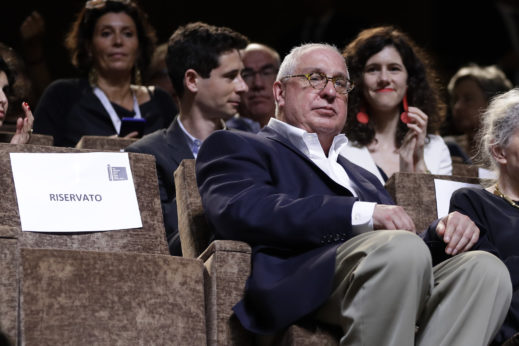
TORONTO—Two controversial political figures were subjects of documentaries at this year’s Toronto International Film Festival (TIFF). They were created by master filmmakers Werner Herzog and Errol Morris, who treated their subjects with kid gloves, considering that both had eventually fallen from the spotlight.
Famed documentarist Errol Morris seems to think that he has the upper hand with his interrogation style filmmaking, but ultimately it’s Robert McNamara, Donald Rumsfeld and now Steve Bannon who take charge of the discussion. Surely the verbal exchange is compelling at times, but why Morris chose Bannon, just when he’s leaving the political scene, is a troubling question. While giving voice to what he calls a “dangerous” subject, Morris unintentionally creates the opposite effect.
The documentary, entitled American Dharma, gives Bannon full rein to say whatever he wants and to spread his right-wing extremist populism. The banter is playful rather than challenging, allowing the subject to explain his extreme views without serious opposition. Bannon even says the McNamara film, Fog of War, inspired him in his filmmaking career, as did Michael Moore’s top-grossing documentaries. Clips of his own films are sprinkled throughout the documentary (Fire from the Heartland, Battle for America), while Bannon’s reactionary politics are further outlined in his self description as a “right wing populist revolutionary.” He states he’s anti-capitalist but never explains what he would replace capitalism with, or what “revolution” looks like in his eyes. His nationalist ideas are based on borders and citizenship, where ethnicity means little. He’s against the “other” and prefers that ethnic groups remain separated. Morris occasionally steps into the discussion, and often into the frame—which is rare in his documentaries. At one point Morris casually states he voted for Hillary, much to Bannon’s shock and amazement.
The “interrogation” is set in a military Quonset hut that was used in an old Gregory Peck movie. This artificial stage setting is useful for flashbacks of Bannon’s political and military career that produced his right-wing ideology, which eventually brought him to the likes of Andrew Breitbart and Donald Trump. “Dharma,” the term used in the film title, is defined as the combination of duty, fate and destiny. Despite his fall in American politics, he’s now in Europe supporting the ultra-nationalists there. That must be his destiny. Morris occasionally makes attempts to confront him: “You’re supposed to be for the people, but your policies are creating destruction and hatred,” allowing Bannon to go on and on espousing his brand of right-wing nationalism.
Fearing he might be used by Bannon to put forward ideas that were repugnant to the filmmaker, Morris gave in, feeling the role of the documentarian is to “investigate and learn something you didn’t know before.” We learn much about what makes a right-wing populist.
Also being generous, Morris had contracted for final cut of the film, while allowing Bannon access to developing versions. Watching Morris’s attempts at “getting at the truth” through his many creative and award-winning documentaries, makes one feel that you can also risk the subject taking over the project. If you didn’t like Bannon coming in, many more will surely like him coming out. Bannon wins.
Meeting Gorbachev
The rare and highly informative Werner Herzog interview with the last president of the USSR, Mikhail Gorbachev, is an even more gushingly sympathetic portrayal of a former political leader. Scorned in Russia and placing dead last in later elections there, Gorbachev was on his way out of history, much like Bannon, but here is brought back to the spotlight in this revealing and compassionate documentary, Meeting Gorbachev.

It’s narrated by the raspy but hushed German-tinged accent of the director himself. It was Gorbachev’s uniting of Germany and bringing democracy (capitalism) there that most impressed Herzog and attracted him to giving Gorbachev a stage to tell his story. And it’s a story about his entire life, from school days to the days he worked his way up in the ranks of the YCL and the Communist Party, bonding with peasants in his region, the many power struggles leading to the waning days of the economic downfall of the Soviet Union, perestroika, glasnost, his eventual fall from grace and the sad loss of his lifelong partner, Raisa.
Herzog describes him as a “tragic figure who failed to see his country survive.” Gorbachev wasn’t strong enough to keep the country together. He took over when industry was down, and the economy broken. He considered himself a communist but rarely talked about political theory, Lenin, Marx and the likes. He tried to keep the Soviet Union together but gave up on the basic tenets of communism. When the attempted military coup took place, the USSR lost the support of the people and Gorbachev was out.
In his post-Soviet days Gorbachev supported Western empire building and later helped the U.S. attack Iraq. He traveled in his private jet, gave speeches sponsored by rich Western supporters, and became the darling of the West and the Russian business oligarchy. Herzog spends more time praising his subject, hoping to win his affection, than posing challenging questions. But still it is a compelling story of a man who lived through some of the most turbulent times in world history. If you didn’t like Gorbachev coming in, many more will surely like him coming out. Gorbachev wins.










